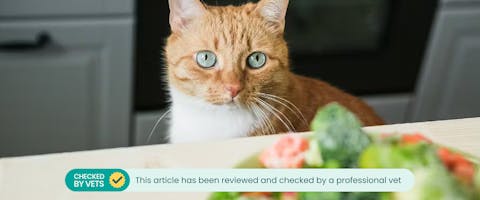Updated 12/05/2023
While getting our five-a-day is recommended for a long life and fighting off diseases, is it the same for other animals? Here, we take a look at whether cats can eat vegetables, and if the health benefits of our favorite greens are spread across species…
Trending posts
Purr-use some of the top blogs our members have been loving this month- Top male dog names for your new furry friendGot a new furry family member in your pack? Check…

- Top female dog names for your new fluffy palWelcoming a new pooch into your family? Explore…

- 250+ gray cat names your silver feline will loveRecently welcomed a fluffy gray bundle of joy into…

- What are normal pet sitting rates?Discover the average pet sitting rates for animals…

- Unique dog names to stand out from the packDare to be different with our list of the best…

Can cats eat vegetables?
While your picky kitty may turn her nose up at veggies, the short answer is yes, cats can eat some vegetables (if they can stomach them!), although some are potentially toxic. Vegetables can offer some health benefits for our feline friends due to the vitamins and minerals they offer. With that said though, the majority of a cat’s diet should be centered around protein - they’re carnivores, afterall, and their digestive systems are highly adapted to digest and process meat, rather than veggies.
While much of a human diet can safely be provided by vegetables, it simply isn’t the same in the cat world. Cats have specific dietary needs, which include certain nutrients that they can only get from meat or animal products. To make sure your kitty is getting the nutrition they need, run any major dietary changes by your vet and make sure you’re opting for a complete, commercially available cat food that meets their nutritional needs. And when it comes to vegetables, think of them as a snack, not as a predominant part of a meal.
What vegetables can cats eat?
Vegetables have a variety of benefits for our fluffy friends, but before going ahead and feeding your kitty any old vegetable, it’s important to check that it’s cat-safe first. Vegetables cats can eat include...
- Cucumber - contains vitamins A and K, great for hydration.
- Cooked broccoli - a source of antioxidants, promotes healthy bowel movements.
- Carrots - contains vitamin A, feed in small quantities and is best avoided if your kitty has a history of bladder stones or crystals in their urine.
- Asparagus - a source of antioxidants and helps with digestion.
- Peas - contains vitamins and minerals that protect a healthy immune system.
- Green beans - great source of fiber, but again, avoid if your cat has had bladder stones or crystals in their urine in the past.
- Spinach - provides an anti-inflammatory effect, but only feed in very small amounts.
Feeding your cat vegetables
Remember that our feline friends are carnivores first, so any vegetables added to their diet should simply act as additional snacks on top of a protein-based diet that’s right for their age and breed. If you’re looking for ways to get more vitamins into your cat’s diet, be sure to check whether the veg they’re about to snack on is cat-safe, as some are toxic to our fluffy friends. Once you’ve chosen the veg you’re going to get your kitty to try, be sure to cook it until soft to help with digestion. Only ever feed vegetables in small quantities, as too much can quickly overwhelm a cat’s digestive system. If your cat has any health issues, vegetables are probably best avoided, or checked with a vet first. And one last thing - if you’re feeding your kitty titbits, make sure it’s not coated with any sauce or seasoning, as these could contain ingredients toxic to our feline friends (like garlic!).
Meet our veterinary expert, Lizzie
This article has been checked by veterinarian Lizzie Youens BSc (Hons) BVSc MRCVS. Lizzie graduated from the University of Bristol in 2011, and has been working in first opinion companion animal practice. She has worked in a variety of clinics across the UK, from large hospitals to small branch practices. She enjoys doing a mixture of medicine, surgery and emergency work. Lizzie currently works in a small rural practice where she enjoys working in a close-knit community.
Other foods that are safe for cats
Despite being lots to avoid, there are quite a few foods us humans enjoy that are safe for felines as well. Like any responsible pet parent, it’s important to know what is and isn’t safe for cats to eat. So to get you started, here are a few human and cat-safe foods…
- Cooked eggs
- Bananas
- Melon flesh
- Oatmeal
- Cooked, boneless fish

